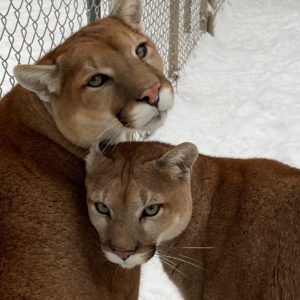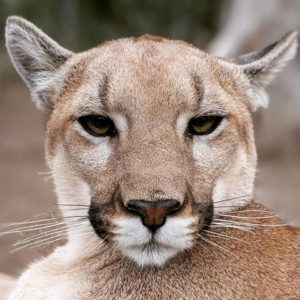aka Cougar, Mountain Lion
A cat native to the Pacific Northwest, they are some of the most active of the feline species especially during the cooler seasons. The largest of the “purring” cats, the puma can entice you with their sweet rumble and chirps. Females in estrus (heat) make a sound reminiscent to a woman screaming as they call out for a “boyfriend”. It can get pretty noisy in the springtime. Being young predators they are particularly enthralled with bright colored, quick moving objects (i.e. small fast paced children). This is why we have signage and reinforcement of “Don’t Run! You Look Like Food!” A play area is provided for the kiddos to get their energy out before visiting the animal exhibit areas 🙂
Puma Facts – Puma concolor
Species: Puma, cougar, mountain lion Puma concolor
Habitat: Forested and mountainous regions of the Americas
Lifespan: Wild 8-13 years; Captivity 18-20 years
Diet: Carnivore
Status: Least concern
Larger than some “big” cats, the Puma – also known as panther (Florida), mountain lion or cougar – is probably more related to smaller cats. Most of its fur is uniformly colored, ranging from light grey through tawny-brown to brick-red, with creamy white underparts. Tail tip and backs of ears are dark brown to black, and the white muzzle is bordered by black. The tail of the Puma is long, distinctive, and tubular. Cubs have rich dark brown spots that usually fade within the first year. The Puma has long muscular rear legs for powerful leaping and very large paws relative to its overall size. It makes many sounds, including an eerily humanlike scream when courting, can purr, but it cannot roar.
Amazingly adaptable, the Puma lives in habitats ranging from tropical rain forest, high mountains, and conifer forest to desert, from sea level to >4,000m. Mostly shuns open areas, but readily passes though marginal habitat. They will live close to humans provided cover and prey are available. Small mammals, such as mice, rats, rabbits and hares, form the staple diet in many areas, as well as occasional sheep, young cattle, moose, and other livestock; the Puma rarely scavenges. Kills reptiles to the size of adult caimans and alligators, and birds such as Wild turkey, various geese and rhea. Readily kills livestock, and sometimes takes domestic pets in peri-urban areas. Hunting is mainly nocturno-crepuscular. Typically discards entrails of large kills before covering them in dirt or leaf litter, consuming the carcasses over a period of 3 days to 4 weeks (winter).
Births peak from February to September. The litter size ranges from 1 -4 (average 2). The spotted cubs are born after a gestation of 92-96 days, in a den among rocks or in a thicket. They take solid food from 6-7 weeks. Cubs are independent at around 18 months
Meet Our Pumas

Hope & Jackson
Hope and Jackson, the brother and sister pair came to us in late 2019 as small cubs. Originally destined for a zoo in New York, frigid weather made the transfer delayed and Cat Tales was contacted regarding possible placement. We were happy to provide them a forever home.
Spotted at birth these siblings have grown into tan adults. Jackson is neutered to prevent sibling breeding and were ultimately separated as adults due to size and seasonal differences. Pumas in the wild are a solitary animal except during breeding season. As adults, Hope and Jackson enjoy having their own spaces. They are some of the most active cats at Cat Tales. Born September 25, 2019

Kachina
Kachina became part of the Cat Tales family in September 2018. Kachina is a name relating to a powerful spirit of the Pueblo people. It is undeniable that Kachina is our wild princess. All her energy and personality has come out fully as she has matured, leaving her a headstrong and cunning puma. An example of perfect camouflage, she is often hiding in plain sight and goes un-noticed until she springs from the shadows. Her personality flip side is her estrus (heat) cycle. This is when Kachina can be heard loudly calling for a mate. Born July 19, 2018.


